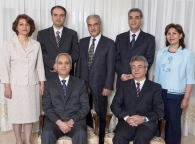
Seven leaders of Iran’s Baha’i community were sentenced to twenty years in prison by a Revolutionary Court in Tehran on 7 August 2010. Although they have done nothing more than peacefully practice their religion, they were convicted on serious, but baseless, charges including “espionage for Israel,” “insulting religious sanctities” and “propaganda against the system.” They had

also been charged with “ifsad fil arz” or “corruption on earth.” All seven are held in Section 209 of Evin Prison in Tehran [IPW Editor: since the sentencing, they were moved to Gohardast prison], which is run by the Ministry of Intelligence. They have only been allowed intermittent access to their lawyers while they have been in custody.
The seven detained Baha’is include two women, Fariba Kamalabadi (age 47, a developmental psychologist and mother of three) and Mahvash Sabet (age 57, teacher), and five men: Jamaloddin Khanjani (age 76), Afif Naeimi (age 48, factory owner), Saeid Rezaei (age 52, agricultural engineer), Behrouz Tavakkoli (age 58, carpentry shop owner, former social worker) and Vahid Tizfahm (age 37, optometrist). All are leading members of a group responsible for the Baha’i community’s religious and administrative affairs. Mahvash Sabet who acted as the group’s secretary, was arrested on March 5 2008. The others were arrested on May 14 2008.
The seven Baha’i leaders have reportedly been held in poor conditions, in small cells without proper bedding. They have been permitted only limited access to their families. Fariba Kamalabadi and Mahvash Sabet were held in solitary confinement for the first few months of their imprisonment.
One of the Baha’is’ lawyers, Abdolfattah Soltani, was himself arrested in June in the crackdown following the disputed June 12, 2009 presidential elections and detained for more than two months. He is a member of the Center for Human Rights defenders, founded by Iran’s Nobel Laureate Shirin Ebadi, which was forcibly shut down by authorities in December 2008.
The detention and prosecution of the seven Baha’i leaders is part of the Iranian authorities’ wide-spread crackdown over the last several years on civil society in Iran, targeting students, journalists, labor activists, women’s activists and academics who have been exercising their rights to peacefully express their opinions. This right and the right to freedom of religion are recognized in international human rights treaties, such as the International Covenant on Civil and Political Rights and the Universal Declaration of Human Rights.
Take Action:
Ayatollah Sadeqh Larijani
Head of the Judiciary
Howzeh Riyasat-e Qoveh Qazaiyeh
(Office of the Head of the Judiciary)
Pasteur St., Vali Asr Ave., south of Serah-e Jomhouri, Tehran, 1316814737
Islamic Republic of Iran
Email: Via website: http://www.dadiran.ir/tabid/75/Default.aspx
First starred box: your given name; second starred box: your family name; third: your email address
box: your given name; second: your family name; third: your
email address
Dear Your Excellency:
I am writing to you to express my concern about the case of seven leaders of Iran’s Baha’i community who were sentenced to twenty years in prison on 7 August 2010. The seven detained Baha’is include two women, Fariba Kamalabadi and Mahvash Sabet and five men: Jamaloddin Khanjani, Afif Naeimi, Saeid Rezaei, Behrouz Tavakkoli, and Vahid Tizfahm. All are leading members of a group responsible for the Baha’i community’s religious and administrative affairs. Mahvash Sabet who acted as the group’s secretary, was arrested on March 5 2008. The others were arrested on May 14 2008. Although they have done nothing more than peacefully practice their religion, they were convicted on serious, but baseless, charges including “espionage for Israel,” “insulting religious sanctities” and “propaganda against the system.”
I urge that while in detention, the seven Baha’is be given access to their families, to their lawyers, and to any necessary medical attention. Furthermore, the seven Baha’i leaders are prisoners of conscience, detained solely for exercising their right to freedom of religion, and I therefore call for their sentence to be overturned and for their immediate and unconditional release. Thank you for your attention.
Sincerely,
More information on the Seven Baha’i Community Leaders
The first session of the Baha’is trial—which had been repeatedly postponed—finally began before a Revolutionary Court in Tehran on January 12, 2010. Two further sessions were held on February 7 and April 12, 2010. Amnesty International has repeatedly criticized proceedings held in Iran’s Revolutionary Courts for their failure to adhere to international standards for fair trials. In fact, the authorities attempted to bar the Baha’is’ lawyers from the courtroom on January 12 and only allowed them access after they insisted upon entering. At the April 12 session, the Baha’is and their attorneys refused to participate in the proceedings when they saw Ministry of Intelligence interrogators and a film crew at what was supposed to be a closed hearing. The judge adjourned the session.
Under Article 502 of Iran’s Penal Code, those convicted of espionage can be sentenced to between one and five years’ imprisonment. Under Article 508, those convicted of the more serious charge of “cooperating with foreign states to harm national security” can face either the death penalty or a sentence of one to 10 years’ imprisonment. “Insulting the religious sanctities” carries the penalty of execution or one to five years’ imprisonment. “Propaganda against the system” carries a penalty of three months to one year’s imprisonment.
The Baha’i faith was founded in Iran about 150 years ago; there are currently an estimated 300,000 Baha’is left in Iran. Since the establishment of the Islamic Republic in Iran, the Baha’i community has faced systematic persecution and harassment. While other minority religions such as Judaism, Zoroastrianism and Christianity are officially recognized, the Baha’i religion is not recognized in Iran’s Constitution and Baha’is are denied equal rights to education and their access to employment and advancement in their jobs is restricted. They are furthermore not allowed to meet or hold religious ceremonies. More than 200 Baha’is were killed after the Iranian Revolution in 1979. A large number of Baha’is left Iran in the following years. The National Spiritual Assembly of the Baha’is of Iran was disbanded in 1983 after the government outlawed all Baha’i administrative institutions. Since then the community’s needs have been met by an informal coordinating group known as the “Yaran” or Friends.
Although persecution of the Baha’is abated since the 1990s, Since President Mahmoud Ahmadinejad was first elected in 2005, harassment has increased and several members of the Baha’i community have been arrested. Three of the seven people named above (Fariba Kamalabadi Taefi, Behrouz Tavakkoli, and Jamaloddin Khanjani) had been arrested previously for their activities on behalf of the Baha’i community. The Iranian authorities have blamed the Baha’is, among other groups, for orchestrating much of the unrest that took place on the Shi’a religious observance of ‘Ashoura on December 27, 2009. At least 13 Baha’is were arrested from their homes in Tehran since the demonstrations of that day. Six Baha’is were arrested in March 2010 for having advocated for the right to higher education for Baha’is.
According to the Baha’i International Community, there are currently 47 Baha’is in detention throughout Iran. Baha’is released on bail have been ordered to pay exorbitant amounts. For example, Aziz Samandari and Jinous Sobhani, a former secretary at the Defenders of Human Rights Center, were released on 11 March 2009 on bail of 700 million Rials (approximately $73,000). Didar Raoufi, Payam Aghsani and Nima Haghar were released on the same day and ordered to pay the same amount. Shahrokh Taef was released six days later on 17 March 2009 having paid the same amount in bail.

[IPW Editor: the website and the form mentioned above are in Persian; Click on the image here to see the email form and instructions on it. Ff you need further help with the form, please contact IPW and we’ll be happy to assist you. Alternatively, you can send an email directly to the email address [email protected] with the above content.]
August 25, 2010 4:43 am
20 Years…..?
Where is Justice ….?
Can u tell me where is it….?